#belgrade moving company
Text

SELITE SE USKORO? Poslovni prostor, stan, kuća, vikendica, inostrantvo ili preko puta ulice u Beogradu, Srbiji ili se selite u ili iz inostranstva?? Prepustite #selidbuProfesionalcima 17 god. u poslu.
063 823 15 15 *
+381 64 00 82 822
#špedija #beošpedicija #beoselidbe #KompletnuUsluguSelidbe #pakovanjePokućstva u kutije, #demontaža #montažanameštaja , #kuhinje - #zaštitaNameštaja #Utovar #istovar #selidbeKamionom nova vozila, modifikovana za što Bezbednije, lakše i brže #uslugeSelidbe - Iskusni radnici, #osiguranjeNameštaja uključeno u #CenuSelidbeBeograd #medjunarodneSelidbe #medjugradskeselidbe #selidbeposlovnogprostorabeograd #selidbestanovabeograd #selidbeZemun #selidbeNoviBeograd #selidbeNoviSad ... #agencijezaselidbeubeogradu #agencijazaselidbebeograd #firmazaselidbebeograd #selidbekancerarijabeograd #selidbeposlovnihprostorijaubeogradu #kamionskiprevozbeograd #selidbekamionbeograd #selidbekancelarijaubeogradu #selidbeubeogradu #movingcompanybelgrade #movingcompaniesinbelgrade #movingservicebelgrade #movingcompaniesinserbia #removalscompaniesinbelgrade #relocationscompaniesinbelgrade #removalsservicesinbelgrade #relocationsservicesinbelgrade #movingcompanynovisad #belgrademovers #beoselidbe #movingendstoragecompanyinbelgrade #moveendstore #movers #movingcompany #movingservice #citymovers #selidbe #selidba #selidbebeogradnavodi #beogradnavodi #beograd #belgrade #transportnopreduzećesrbija #prebozkamionombeograd #kamiosnkiprevozubeogradu #firmazaselidbekamionom
#selidbe beograd#selidbe#selidbe zemun#selidbekamionbeograd#selidbe poslovnog prostora beograd#agencija za selidbe beograd#firma za selidbe Beograd#selidbe zemun s#selidbe novi beograd#agencije za selidbe u beogradu#selidbe kamionom beograd#selidbe kamion beograd#profesionalne firme za selidbe u Beogradu#moving company belgrade#moving companies in belgrade#removals companies in serbia belgrade#relocations companies in belgrade serbia#belgrade movers#belgrade moving company#beo movers#beo moving#beo move end store#služba za selidbe beograd
0 notes
Text
авантура Цанмома у Београду
avantura Canmoma u Beogradu, or, the adventure of canmom in Belgrade
it's another one of these 'travels of canmom' posts! last time we went to Gamescom in Germany. this time I went to Belgrade for a company event.
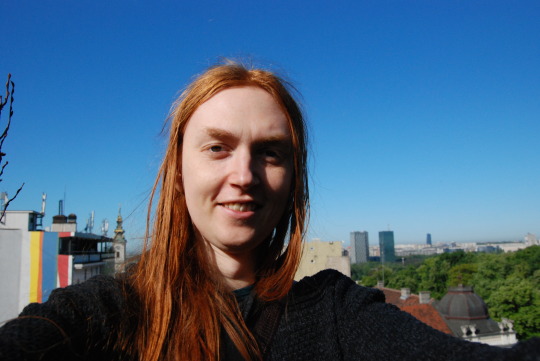
I can't actually talk that much about this one because the main thing I was doing was cooking up game pitches for what we might work on next (kind of like a game jam but just for concepts), and while that was very interesting and I learned a lot about how to get ideas across in limited time and make judgements about what videogames might sell and how long they'd take to make and such... it is however probably not something I can talk in too much detail about yet, because we might end up making these games, so I can't be like 'the theme was x and we pitched y'.
so instead I will mostly talk about Belgrade! and show some of the photos I took that don't have game developers wandering around in them.
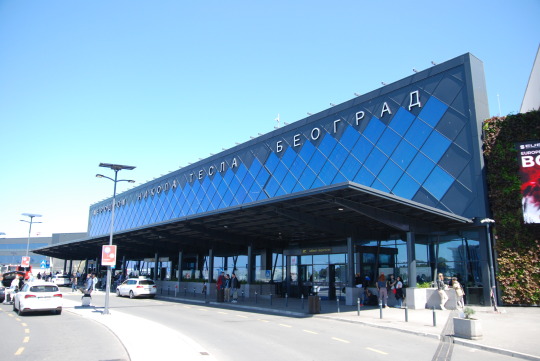
that's Nikola Tesla airport. did you know that Nikola Tesla was from modern-day Serbia (at the time, the Austrian Empire)? I didn't but I do now!
most of the week was spent in this fancy villa...
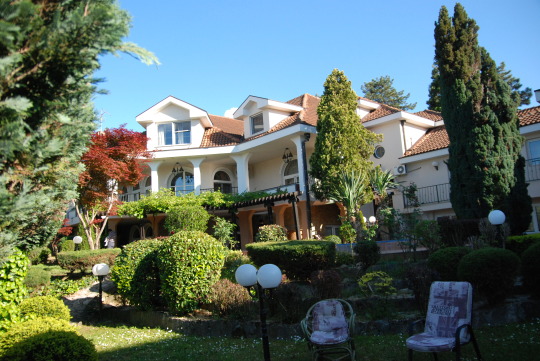
...which is called the Villa Saga Paradiso. it must once upon a time have been some stinking rich family's holiday home, because it's a super weird building, with such features as a pool table, swimming pool, tennis court, library, and even a weird kinda stage thing on the top floor. definitely full of weirdly shaped rooms and interesting old furniture, it felt kinda like a place a moomin might hole up. so here's some pics of the place.

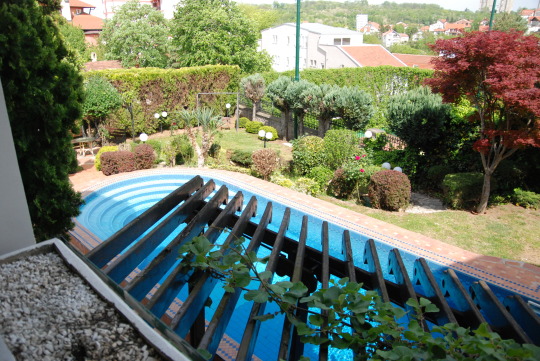



also the view was kinda insane...
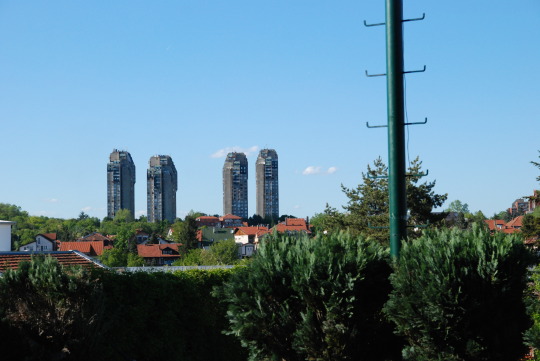
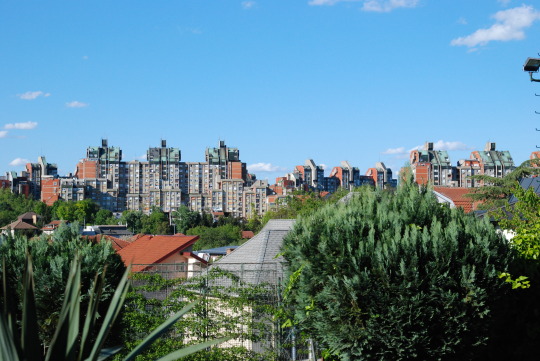
also! here's a pic of a Serbian snail that came out rather nice:

anyway on Saturday we went into the city centre to do some more touristy shit. I went to the two places in Belgrade that presumably everyone goes, namely the Fortress and the Temple. but I also got some shots of the city centre...
(also a tram shot for the trams girls in the audience)
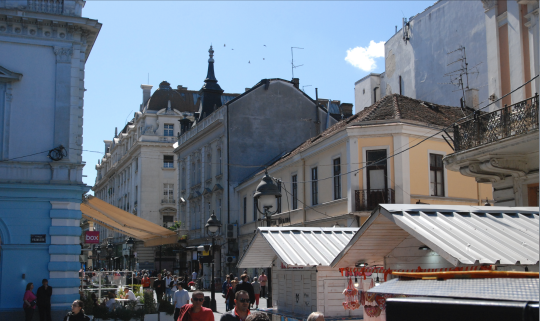
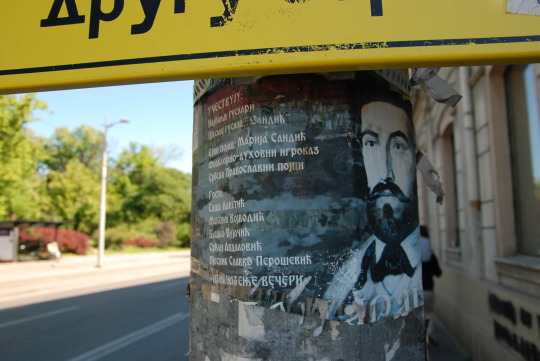
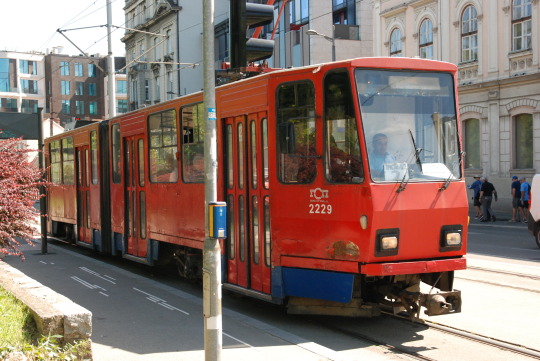
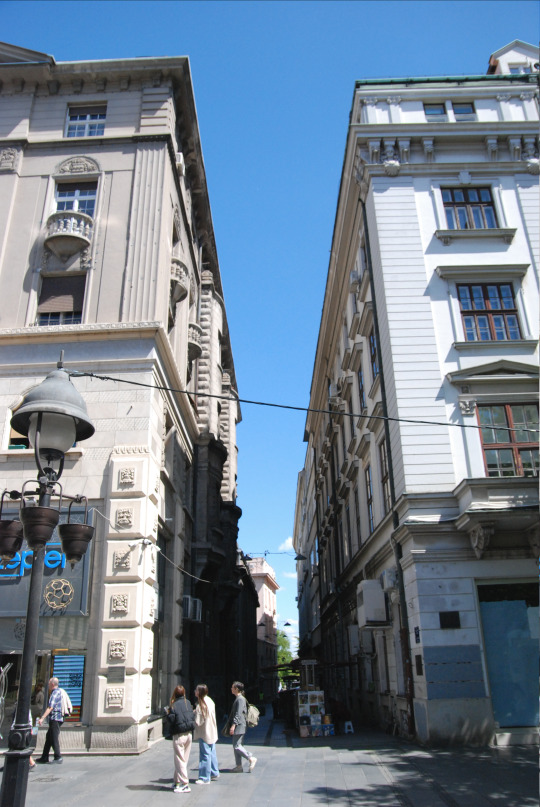

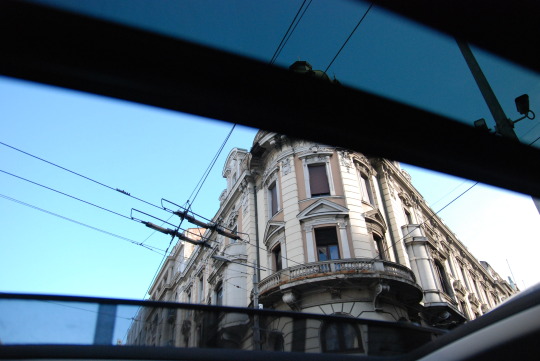
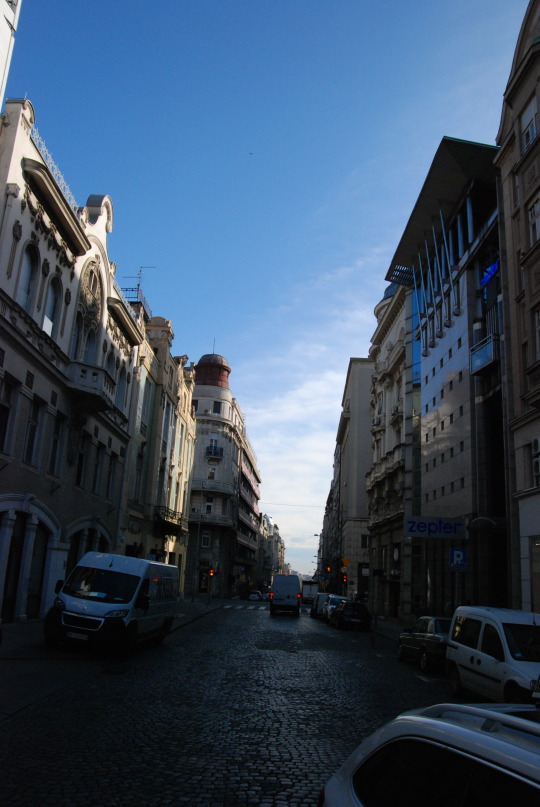
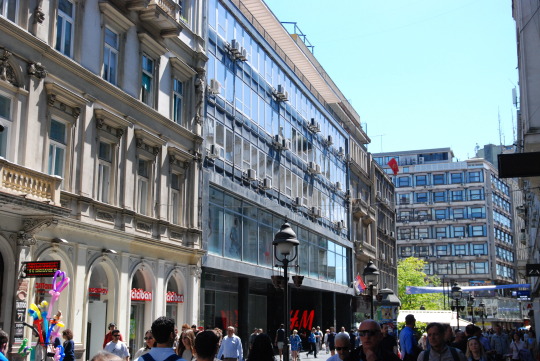
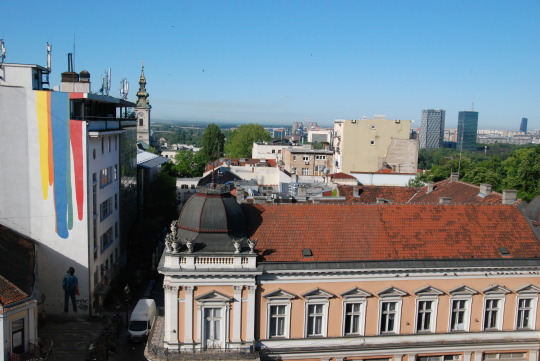
so as you can see, the vibes of central Belgrade are p Southern European sorta architecture, lots of pale stone walls and tiled roofs and the like. but you also have these crazy cool looking tower blocks from the communist period...
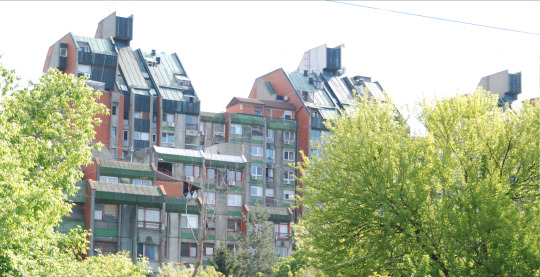
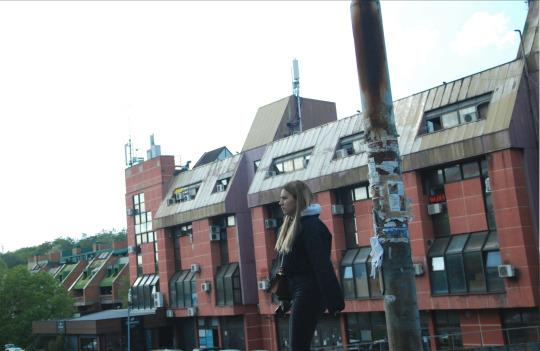
...which were unfortunately quite hard to photograph out of a moving car window.
But yeah, we were on our way to the fortress.
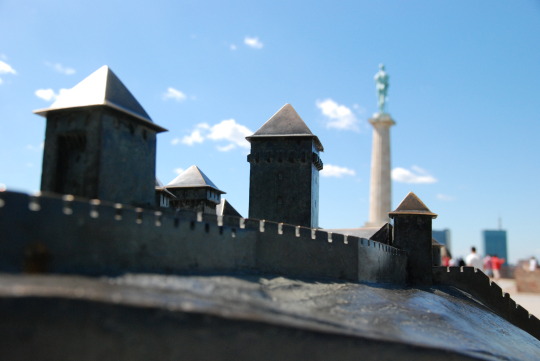
Belgrade Fortress has a pretty storied history. At one point it simply was Belgrade; even after that, it's been occupied by variously the Byzantines, Turks and Austrians, who all made various additions and modifications to the fortress, and sometimes accidentally blew it up. Nowadays it's become a kind of park and tourist area, surrounded by the river, and thus some pretty impressive views...
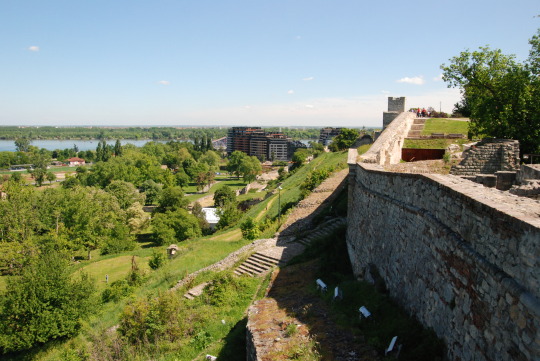

as well as various things that tourists might like to look at, like statues of dinosaurs and tanks, and people dressed Historically.
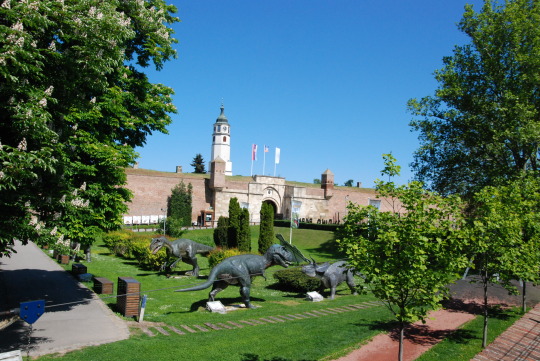
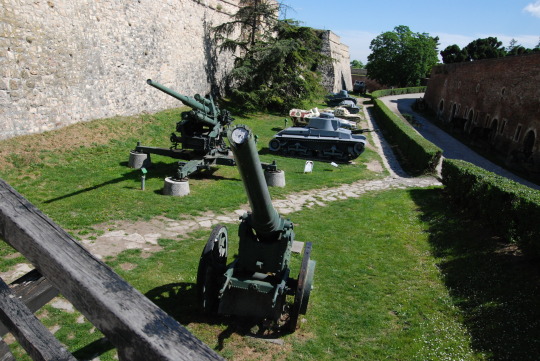
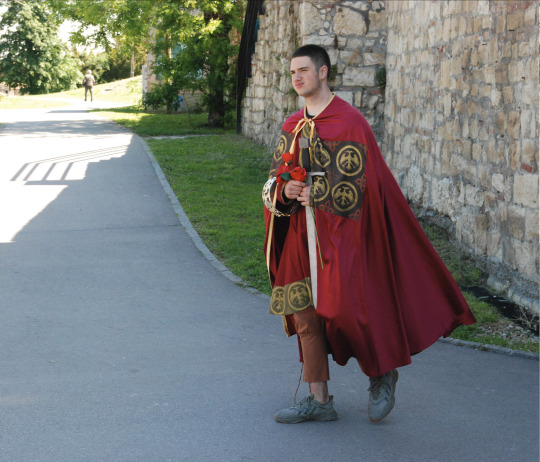
apparently you're only allowed 30 images in a post, so let me make another one for the Temple, which was the craziest building I saw, and the butt statue...
34 notes
·
View notes
Text
Serbia’s Higher Prosecution Office has been shaken again, this time by accusations about forged statements. Zeljka Nikolaidis, a prosecutor for organised crime in the Higher Public Prosecution, confirmed to BIRN that her alleged statement used in a disciplinary complaint against her superior, Nenad Stefanovic, and his deputy, Brankica Maric, was forged.
The statement was submitted without her signature, with the Prosecution Office facsimile misused without her knowledge during her vacation, she said.
Her alleged statement, which she called “80 per cent inaccurate”, was used in favour of Stefanovic and Maric in a disciplinary case initiated by two other prosecutors who were previously moved from their posts against their will while leading a corruption case involving a company linked to the ruling party.
The disciplinary case against Stefanovic and Maric, who were previously accused of favouring the ruling party, was dismissed.
“I cannot say who did it but my logic says that it was probably those who had an interest to do that. The disciplinary case was against Stefanovic and Maric. My statement likely influenced that case against them being dropped,” Nikolaidis told BIRN. She added that she will ask for the removal of her statement.
“This is a serious criminal offence and the Prosecution for Organised Crime needs to react,” she said.
Nikolaidis resigned a month ago as chief of the Special Department for the fight against corruption in the Public Prosecutors Office but has remained to work as a prosecutor.
The stir in the Higher Public Prosecutor’s Office started in February when two prosecutors – Bojana Savovic and Jasmina Paunovic – who had worked on a corruption case in EPS, the state-owned electric power company, were transferred to other positions.
Their removal came after the police arrested six people suspected of having lost EPS $7.5 million during the performance of works at the thermal power plant Kostolac B. Some of the suspects were employees of a company long linked with the ruling Serbian Progressive Party.
Prosecutor Stefanovic and his associate Maric denied a political motivation for the removals but giving several conflicting explanations about the reasons for transferring the prosecutors in the middle of an operation to arrest the suspects.
The Association of Prosecutors of Serbia has backed Savovic and Petrovic, while a protest was held in Belgrade in their support with calls for the independence of judiciary.
2 notes
·
View notes
Text
On today’s episode of World War III is Just Around the Corner:
“Although the buildup was largely overlooked by Western media at the time—and has since been forgotten amid the outbreak of war between Israel and Hamas—it is part of an alarming development in the Balkans. The immediate pretext for the Serbian mobilization was months of unrest between Kosovo and Serbia, which have maintained a fragile peace ever since a NATO bombing campaign helped Kosovo win de facto independence from Belgrade in the 1998–99 war. In May, Serbia placed its troops on combat alert after ethnic Serbs living in Kosovo clashed with Kosovo police. And then in September, just before the recent mobilization at the border, 30 heavily armed ethnic Serbs attacked a police patrol in Kosovo, leaving four people dead.
But there are many indications that these incidents go beyond the familiar tensions that persisted in past years. These incidents also show the growing threat that Russia, Serbia’s partner, is posing to the region. In 2022, for example, Serbian Prime Minister Ana Brnabic said that Kosovo and Serbia were “on the brink of armed conflict.” And Moscow—which does not recognize Kosovo’s independence—fanned the flames, using information operations to fuel Kosovar-Serbian distrust and to spread hawkish messages that polarize the region along ethnic and religious lines. Russia has also armed Serbia while increasing Serbia’s energy dependence on its companies by providing gas and oil at a sharp discount. Moscow has promised Belgrade that it will block Kosovo from becoming a UN member state. “A big explosion is brewing in the center of Europe,” Russian Foreign Minister Sergei Lavrov said in May. It might have been a boast.
(…)
It is time, then, for NATO to decisively put an end to Vucic’s Kremlin-enabled sideshow. The United States and Europe must make it clear to Belgrade and Moscow that they will react strongly, and harshly, to future Balkan provocations. They must strengthen NATO’s presence in the region and establish credible redlines that Serbia cannot cross without provoking a military confrontation with NATO forces. And they must sanction Belgrade if Serbia’s leaders do not move away from Moscow and de-escalate tensions.
(…)
For Putin, this opening has been a boon. Russia views the Balkans as Europe’s soft underbelly, and Moscow believes that Serbia is its most vulnerable spot. His goal is to turn Moscow into the Balkans’ only reliable conflict negotiator—giving the Kremlin leverage over Western powers. After all, if peace in the Balkans depends on Putin, NATO officials might have to make concessions to Moscow if they want to avoid war. By pushing the Balkans to the brink, he also hopes to show that NATO is a paper tiger and will not act if truly tested. Even if NATO does fight back against Serbia, Putin could still win. By opening another front, the West would have less capacity to help Ukraine.
The Kremlin has other reasons to support chaos in the Balkans. Putin uses the so-called Kosovo precedent to defend its illegal invasion of Ukraine, arguing that the annexation of Ukrainian territories is justified by Kosovo’s independence. According to this perverse logic, articulated by Russia’s permanent UN representative in a January speech, the illegal and wildly fraudulent annexation referendums held in occupied Ukrainian territories are akin to Kosovo’s fight for freedom from Serbia more than two decades ago. Kosovo, in other words, had the right to leave Serbia, and so the occupied Ukrainian territories have the right to join Russia. (The fact that Russia does not recognize Kosovo’s independence, or that Kosovo’s independence is, in fact, a precedent for Ukraine’s own fight for freedom, are ironies that Moscow has not addressed.)
(…)
If the West continues to enable Vucic, it will simply embolden him. He will keep testing NATO and trying to prove that the alliance is toothless. The West has already given him encouraging signals: after more than 30 NATO peacekeepers were injured in the May clashes with Serbian protesters, the alliance did not detain the violent protesters out of fear that doing so would escalate the conflict. But such restraint is an invitation for further escalation by Vucic, as well as by the Kremlin. Russian officials are watching what happens in Kosovo and wondering whether they can get away with attacking NATO forces and installations.
(…)
To try to contain the conflict, a week after the May attack, NATO increased its presence in the region with a new legion of roughly 500 Turkish soldiers. NATO also deployed hundreds of British troops to the country in October. But these measures are insufficient. NATO must create a coalition of the willing, headed by the United States, that can send successfully pressure Belgrade and Moscow to stop promoting political instability. That means making it clear to Vucic that, if he continues to take escalatory measures, he will face an escalating series of tangible consequences—including, possibly, sanctions.
The West is well positioned to take such steps. In June 2021, U.S. President Joe Biden signed an executive order allowing Washington to impose sanctions against anyone who destabilizes the Western Balkans. Washington should not be shy about using them against individuals who (in the words of the order) “threaten the peace, security, stability, or territorial integrity” in the region. For American sanctions to have maximum effect, the United Kingdom and the EU should join Washington’s efforts. European leaders should, at a minimum, make future assistance to Serbia dependent on specific policy shifts in Belgrade. The EU, for example, could condition further aid on Vucic’s imposing sanctions on Russia, aligning its foreign policy with that of the bloc, tamping down on regional provocations, and fulfilling the EU’s reform agenda—especially when it comes to the rule of law and media freedom.
On the ground, NATO should deploy teams in Kosovo that counter Russia’s and Serbia’s propaganda machine. These teams should target far-right Serbian groups and remind them that Russian messaging about a “Slavic brotherhood”—to which Serbia ostensibly belongs—is a myth and that if conflict does erupt, Putin will not help them. To do so, all they need to do is speak the truth: Putin has his hands full fighting a losing war against Ukraine, and he will not provide resources to Serbia for an armed conflict with Kosovo. As evidence, these teams could point to the September war between Armenia and Azerbaijan. Russia is a longtime ally of Armenia, and yet despite Armenia’s requests, Russia provided it with no military support in the recent conflict, which Armenia lost. The teams could also remind Serbian nationalists that Moscow did not help them during the wars in the 1990s.
NATO states may not want to take these measures. In fact, they probably want to ignore Vucic altogether. The alliance has been worn thin helping Ukraine, so expending time and resources on Kosovo and Serbia may feel like too much, especially when they can just buy off the latter country’s president.
But the West must realize that, if left to fester, tensions in these states could become far more difficult—and expensive—to address. What happens in Kosovo and Serbia rarely stays in those countries, and this crisis could easily spill over to other Balkan states. Nearby North Macedonia, which belongs to NATO, might get dragged in. Further escalations in Kosovo will also invite chaos in Bosnia and Herzegovina, where Bosnian Serb leader Milorad Dodik—who has close ties to Putin—has threatened to have Bosnia’s Serbian territories secede. In October, Dodik even emphasized that Serbs should “form a single state,” consisting of Serbia, Republika Srpska, and Montenegro.
A widening conflict would be an even bigger gift for Putin, who wants the West to train its attention away from Kyiv as he fights to seize more of that country. To protect Europe and stop the Kremlin, it is therefore essential that NATO fortify its Balkans flank right now, while the costs of doing so are still cheap.”
“Russia on Tuesday formally withdrew from a landmark security treaty which limited key categories of conventional armed forces, blaming the United States for undermining post-Cold War security with the enlargement of the NATO military alliance.
The 1990 Treaty on Conventional Armed Forces in Europe (CFE), signed a year after the fall of the Berlin Wall, placed verifiable limits on categories of conventional military equipment that NATO and the then-Warsaw Pact could deploy.
The treaty was designed to prevent either side of the Cold War from amassing forces for a swift offensive against the other in Europe, but was unpopular in Moscow as it blunted the Soviet Union's advantage in conventional weapons.
Russia suspended participation in the treaty in 2007 and halted active participation in 2015. More than a year after the full-scale invasion of Ukraine, President Vladimir Putin in May signed a decree denounced the pact.
Russia's foreign ministry said Russia had formally withdrawn from the pact at midnight - and that the treaty was now "history".”
“NATO member countries that signed a key Cold War-era security treaty froze their participation in the pact on Tuesday just hours after Russia pulled out, raising fresh questions about the future of arms control agreements in Europe.
Many of NATO’s 31 allies are parties to the Treaty of Conventional Armed Forces in Europe, which was aimed at preventing Cold War rivals from massing forces at or near their mutual borders. The CFE was signed in November 1990 as the Soviet bloc was crumbling but was not fully ratified until two years later.
NATO said that Tuesday’s action by its signatory members was required because “a situation whereby Allied State Parties abide by the Treaty, while Russia does not, would be unsustainable.”
(…)
U.S. National Security Adviser Jake Sullivan said suspending the obligations by Washington and its allies will strengthen NATO’s “deterrence and defense capacity by removing restrictions that impact planning, deployments, and exercises -– restrictions that no longer bind Russia after Moscow’s withdrawal.”
(…)
Last week, Putin signed a bill revoking Russia’s ratification of the Comprehensive Nuclear Test Ban Treaty, a move that he said was needed to establish parity with the United States.
In February, with U.S.-Russia tensions running high over Ukraine, Moscow suspended its participation in the New START Treaty, the last arms control pact that remains between the two countries.
Both countries also pulled out of the 1987 Intermediate-range Nuclear Forces Treaty in 2019, blaming each other for violations.”
“Europe had been moving towards the slaughterhouse for years, and by 1914 a conflict was all but inevitable—that, at least, is the argument often made in hindsight. Yet at the time, as Niall Ferguson, a historian, noted in a paper published in 2008, it did not feel that way to investors. For them, the first world war came as a shock. Until the week before it erupted, prices in the bond, currency and money markets barely budged. Then all hell broke loose. “The City has seen in a flash the meaning of war,” wrote this newspaper on August 1st 1914.
Could financial markets once again be underpricing the risk of a global conflict? In the nightmare scenario, the descent into a third world war began two years ago, as Russian troops massed on the Ukrainian border. Today Israel’s battle against Hamas has the frightening potential to spill across its borders. American military support is crucial to both Ukraine and Israel, and in Iraq and Syria the superpower’s bases have come under fire, probably from proxies of Iran. Should China decide it is time to take advantage of a distracted superpower and invade Taiwan, America could all too easily end up being drawn into three wars at once. The rest of the world risks those wars interlocking and turning into something even more devastating.
This scenario would of course place financial damage a long way down the list of horrors. Even so, it is part of an investor’s job to consider exactly what it would mean for their portfolio. So far the possibility of a world war has barely caused a tremor in the markets. True, they have for some time now been more seized by fear than greed. Bond prices have been turbulent, even for supposedly risk-free American Treasuries, and yields have been climbing for most of this year. Stock indices in America, China and Europe have fallen for three consecutive months. Yet this choppiness can all be plausibly explained by peacetime factors, including outsized government borrowing, interest-rate expectations and shareholders whose previous optimism had got the better of them.
In short, it does not look anything like the panic you might expect if the odds of the world entering into war were edging higher. The brightest conclusion is that such odds really are close to zero. A darker one is that, like the investors of 1914, today’s may soon be blindsided. History points to a third possibility: that even if investors expect a major war, there is little they can do to reliably profit from it.
(…)
War, in other words, involves a level of radical uncertainty far beyond the calculable risks to which most investors have become accustomed. This means that even previous world wars have limited lessons for later ones, since no two are alike. Mr Ferguson’s paper shows that the optimal playbook for 1914 (buy commodities and American stocks; sell European bonds, stocks and currencies) was of little use in the late 1930s. Investors in that decade did try to learn from history. Anticipating another world war, they sold continental European stocks and currencies. But this different war had different winning investments. British stocks beat American ones, and so did British government bonds.
Today there is a greater and more terrible source of uncertainty, since many of the potential belligerent powers wield nuclear weapons. Yet in a sense, this has little financial relevance. After all, in a nuclear conflagration your portfolio would be unlikely to rank highly among your priorities. The upshot of it all? That the fog of war is even thicker for investors than it is for military generals, who at least have sight of the action. If the worst happens, future historians might wonder about the seeming insouciance of today’s investors. They will only be able to do so because, for them, the fog will have cleared.”
#russia#putin#ukraine#nato#arms control#europe#cfe#serbia#kosovo#armenia#azerbaijan#world war#world war 3#wwiii#balkans#china#taiwan
3 notes
·
View notes
Text
Have you ever met someone who calls themselves a “successful businessman,” but lost his company $77 million, is being sued by former employees for allegedly stiffing them out of their pay, fraudulently certified his company as a socially disadvantaged business to try to win government contracts, prompted his biggest investor to cash out of the company and abandon their stake in it, and has had multiple board members resign from his company on his watch – all while paying himself fat multimillion-dollar bonuses?
Maybe you haven’t met him in person, but you’ve certainly heard of him. His name is Tim Sheehy, and he’s running for the United States Senate.
I live in Gallatin County and I’m best known for my work as a financial expert. For decades, I’ve made a career of going after the “bad guys” in finance – I bet against those that I suspect of fraud. That’s how I’ve earned my living, and that’s why I knew there was something fishy about Tim Sheehy and his company.
I was right.
Tim Sheehy has run a campaign rooted in his experience as a business owner. He regularly touts his credentials on the campaign trail, specifically describing the company he started in Belgrade when he moved here nine years ago a “success.”
Recent financial filings tell us the real story.
Tim Sheehy’s company’s stock has plummeted to all-time lows. It lost $77 million and is facing financial straits so dire that there is “substantial doubt about the Company’s ability to continue,” according to their public filings. A series of abysmal decision-making has caused investors to lose faith and abandon the company. All while Sheehy walked away with multimillion-dollar bonuses, paying himself $2.3 million as his company was deeply in the red.
It’s not just bad decision-making. Sheehy’s actions have questionable legality.
0 notes
Text
Serbian president says he received coup warning from Russia
New Post has been published on https://sa7ab.info/2024/08/16/serbian-president-says-he-received-coup-warning-from-russia/
Serbian president says he received coup warning from Russia


Aleksandar Vucic has said the security services are working on leads provided by Moscow
Russia warned Serbia about a potential coup attempt, President Aleksandar Vucic told journalists on Friday. His statement came a day before an expected protest in the nation’s capital. According to Vucic, Serbia’s Security Intelligence Agency (BIA) is already acting on the leads provided by Moscow.
“We received official information from the Russian Federation, information transmitted and brought through official channels,” the president said, adding that the authorities “are dealing with it” and there is no reason to worry.
Vucic did not elaborate on where the threat comes from or who is behind it. “Serbia is moving forward and they cannot and will not stop it,” he said
Earlier, Serbian news outlets reported that the Russian security services warned Vucic about riots that are being planned in Serbia with the ultimate goal of overthrowing the nation’s leadership.
Read more
Kremlin speaks out on attempted Serbian ‘Maidan’
Serbian daily Vecernje Novosti said on Friday that it obtained a “color revolution handbook” supposedly published for participants of ecological protests expected on Saturday. The handbook describes methods reminiscent of color revolutions in other nations, the outlet claimed, adding that the protests are likely to be coordinated from “centers of power” abroad, but did not accuse anyone in particular.
The news comes as the nation braces for ecological protests this weekend. In July, there was a standoff between eco-activists and the government over a lithium mine project. Last month, Belgrade granted British-Australian company Rio Tinto a license to develop a lithium mine in the Jadar region in the western part of the country, which is set to become the biggest in Europe, according to Reuters.
The project did not sit well with local farmers and villagers, who argued that the mine would severely pollute the surrounding area. Activist and farmer Zlatko Kokanovic told Reuters that the mine would “free the European Union from reliance on China” regarding lithium at the expense of people’s health.
READ MORE: Serbia and US are ‘historical allies’ – Vucic
The government believes the $2.4 billion Jadar lithium project will be a major boost for the economy. The mine could account for 90% of the EU’s needs for lithium, according to Reuters. Protesters have demanded that the government ban lithium mining in Jadar by August 10, saying they will announce their next steps at a rally on Saturday.
0 notes
Text
Renting Tow Trucks
We often hear the term "tow trucks" when encountering various road incidents like accidents, breakdowns, or even with unregistered vehicles. The same principle applies to truck rentals. You rent them to transport your vehicle, offering different options tailored to your convenience. However, such services can often be more expensive than standard vehicle rentals. There are times when you find yourself needing this type of vehicle urgently, leaving you with no choice but to rent a truck.

Many families opt to rent such vehicles when relocating, allowing them to fly to their destination and alleviate the burden of driving long distances themselves. With truck rentals in high demand, tow trucks for rent are also gaining popularity in the market. They attract customers who are moving internationally or across countries, seeking to lighten the load of driving their vehicles over extensive distances from their old residences to their new ones.
Imagine transporting a vehicle across states or countries—consider the fuel costs, time required, and the physical effort involved in such a journey. Renting tow trucks is a straightforward solution similar to renting standard trucks. All you need to do is ensure everything is checked, plan your move accordingly, and find the right company that fits your needs, Bozeman affordable towing.
Company Name: Bozeman Towing Service
Website: www.buttetowing.com/bozeman-mt.html
Company Phone: 406-548-9819
Address: 460 Green Tree Dr, Belgrade, MT 59714
1 note
·
View note
Text
X FACTOR INDIA WINNER, GEET SAGAR, JOINS THE CAST OF FRANKIE GOES TO BOLLYWOOD
X Factor India winner (2011), Geet Sagar, joins the cast of Rifco Theatre Company’s musical extravaganza, Frankie Goes To Bollywood, for the last leg of its national tour. The production, currently at Belgrade Theatre Coventry, will then move on to New Theatre Cardiff from 16 July to 20 July. Geet will also appear in the production as it makes its debut at the Southbank’s Queen Elizabeth Hall…
0 notes
Text
Events 12.15 (before 1920)
533 – Vandalic War: Byzantine general Belisarius defeats the Vandals, commanded by King Gelimer, at the Battle of Tricamarum.
687 – Pope Sergius I is elected as a compromise between antipopes Paschal and Theodore.
1025 – Constantine VIII becomes sole emperor of the Byzantine Empire, 63 years after being crowned co-emperor.
1161 – Jin–Song wars: Military officers conspire against the emperor Wanyan Liang of the Jin dynasty after a military defeat at the Battle of Caishi, and assassinate the emperor at his camp.
1167 – Sicilian Chancellor Stephen du Perche moves the royal court to Messina to prevent a rebellion.
1256 – Mongol forces under Hulagu enter and dismantle the Nizari Ismaili (Assassin) stronghold at Alamut Castle (in present-day Iran) as part of their offensive on Islamic southwest Asia.
1270 – The Nizari Ismaili garrison of Gerdkuh, Persia surrender after 17 years to the Mongols.
1467 – Stephen III of Moldavia defeats Matthias Corvinus of Hungary, with the latter being injured thrice, at the Battle of Baia.
1546 – The town of Ekenäs (Finnish: Tammisaari) is founded by King Gustav Vasa of Sweden.
1651 – Castle Cornet in Guernsey, the last stronghold which had supported the King in the Third English Civil War, surrenders.
1778 – American Revolutionary War: British and French fleets clash in the Battle of St. Lucia.
1791 – The United States Bill of Rights becomes law when ratified by the Virginia General Assembly.
1836 – The U.S. Patent Office building in Washington, D.C., nearly burns to the ground, destroying all 9,957 patents issued by the federal government to that date, as well as 7,000 related patent models.
1864 – American Civil War: The Battle of Nashville begins at Nashville, Tennessee, and ends the following day with the destruction of the Confederate Army of Tennessee as a fighting force by the Union Army of the Cumberland.
1869 – The short-lived Republic of Ezo is proclaimed in the Ezo area of Japan. It is the first attempt to establish a democracy in Japan.
1871 – Sixteen-year-old telegraphist Ella Stewart keys and sends the first telegraphed message from Arizona Territory at the Deseret Telegraph Company office in Pipe Spring.
1890 – Hunkpapa Lakota leader Sitting Bull is killed on Standing Rock Indian Reservation, leading to the Wounded Knee Massacre.
1893 – Symphony No. 9 ("From the New World" a.k.a. the "New World Symphony") by Antonín Dvořák premieres in a public afternoon rehearsal at Carnegie Hall in New York City, followed by a concert premiere on the evening of December 16.
1899 – British Army forces are defeated at the Battle of Colenso in Natal, South Africa, the third and final battle fought during the Black Week of the Second Boer War.
1903 – Italian American food cart vendor Italo Marchiony receives a U.S. patent for inventing a machine that makes ice cream cones.
1905 – The Pushkin House is established in Saint Petersburg, Russia, to preserve the cultural heritage of Alexander Pushkin.
1906 – The London Underground's Great Northern, Piccadilly and Brompton Railway opens.
1914 – World War I: The Serbian Army recaptures Belgrade from the invading Austro-Hungarian Army.
1914 – A gas explosion at Mitsubishi Hōjō coal mine, in Kyushu, Japan, kills 687.
1917 – World War I: An armistice between Russia and the Central Powers is signed.
0 notes
Text
BBC 0428 5 May 2023
12095Khz 0359 5 MAY 2023 - BBC (UNITED KINGDOM) in ENGLISH from TALATA VOLONONDRY. SINPO = 55444. English, dead carrier s/on @0358z with Al'Seela modulation in the bg, then ID@0359z pips and newsday preview. @0401z World News anchored by Neil Nunes. Five members of the far-right Proud Boys, including former leader Enrique Tarrio, face decades in prison after being found guilty for their role in the January 6 US Capitol riot. A man has been arrested after eight died and 14 were injured in Serbia's second mass shooting in a week. The attack occurred shortly after midnight near a village some 60km (37 miles) south of Belgrade when the shooter opened fire from a moving car. Tech bosses were summoned to the White House on Thursday and told they must protect the public from the dangers of Artificial Intelligence (AI). Sundar Pichai of Google, Satya Nadella of Microsoft, and OpenAI's Sam Altmann were told they had a "moral" duty to safeguard society. The White House made it clear that it may regulate the sector further. The leader of Russia's Wagner mercenary group says he will withdraw his troops from the Ukrainian city of Bakhmut on 10 May because of ammunition shortages. Yevgeny Prigozhin's statement came after he posted a video of him walking among his dead fighters' bodies, blaming top Russian defence officials. HSBC has fought off an attempt by its biggest shareholder to break up the bank during a frequently tense annual general meeting. Chinese insurer Ping An has been trying for more than a year to split the bank. On Friday it failed to gain the backing of any other major shareholder as investors voted to reject the proposal. Sports. Two British companies are to fly an innovative, low-cost radar satellite, part of which will be knitted on a knitting machine. It features a knitted tungsten wire mesh that's folded tightly for launch but which will spring out once in orbit to form a large umbrella-like shape. @0406z "Newsday" begins. Backyard fence antenna, Etón e1XM. 250kW, beamAz 315°, bearing 63°. Received at Plymouth, United States, 15359KM from transmitter at Talata Volonondry. Local time: 2259.
0 notes
Text










#UslugeSelidbeBeograd SRB, EU i #skladištenja; +381 63 823 15 15 * +381 64 00 82 822 www.wellpack.org/sr/ #selidbeposlovnogprostorabeograd #selidbebeograd #kamionselidbebeograd #selidbeiprevozkamion #selidbefirmebeograd #selidbekancelarija #selidbekompanija #selidberestoranabeograd #selidbeklavira #selidbeubeogradu #agencijazaselidbebeograd #firmazaselidbebeograd #selidbezemun #selidbenovibeograd #selidbenovisad #medjunarodneselidbe #selidbeuinostranstvo #selidbeiprevozinostranstvo #medjunarodneselidbebeograd #movingcompaniesbelgrade #movingcompanybelgrade #belgraderemovals #belgraderelocations #beoselidbe #beomovers #belgrademovingservices
#selidbe beograd#selidbe#selidbe zemun#selidbe poslovnog prostora Beograd#selidbe firmi beograd#selidbe kancelarijskog prostora u Beogradu#moving company belgrade#kamion selidbe Beograd#selidbe kamionom Beograd#agencija za selidbe beograd
1 note
·
View note
Text
BEO SELIDBE & SKLADIŠTENJA DOO http://www.beo-selidbe.rs/ 011-215 00 00 * 064-00 82 822 064-93 81 331 Zahumska 30. 11000 Beograd Vračar.
BEO REMOVAL & STORAGE L.T.D.
http://en.beo-selidbe.rs/
+381649381331 +vyber
#selidbe beograd#selidbe novi beograd#selidbe zemun#firma za selidbe beograd#agencija za preseljenje beograd#agencija za selidbe u beogradu#selidbe firme i kancelarija beograd#firma za selidbe firmi#selidbe firme beograd#selidbe poslovnih prostorija beograd#http://www.beo selidbe.rs/ selidbe beograd cena#http://www.beo selidbe.rs/ selidbe beograd београд#http://www.beo selidbe.rs/ služba za selidbe beograd#http://www.beo selidbe.rs/ selidbe beograd#http://www.beo selidbe.rs/#moving company in belgade#storage facilities in belgrade serbia
1 note
·
View note
Text
Aleksandar Sapic, of the Serbian Progressive Party, SNS, was elected mayor of Serbia’s capital on Monday by the ruling party-controlled Belgrade Assembly, sitting for the second time since it won rerun elections earlier this month.
This will be Sapic’s second mandate; he was first elected in June 2022. Of a total of 110 councillors, 82 took part in the vote, of whom 64 voted for the former water polo star.
Monday’s session marked the end of months of uncertainty. Since the end of October 2023, Belgrade has been managed by a temporary authority headed by Sapic.
After he was elected, Sapic listed the social measures and infrastructure projects that the city administration implemented during his previous period in office. “I assure you that this city will experience the greatest infrastructural, qualitative and social changes in the next four years,” he promised.
Declaring himself a “Serbian mayor”, he claimed that the opposition, if given the opportunity, would have put up “colourful flags”, alluding to the rainbow Pride flag.
In the same session, members of the City Council were also elected, as well as Mayor Duty Vesna Vidovic, who was reelected.
In elections on June 2, the Progressive Party list, Aleksandar Vucic – Belgrade Tomorrow, won 64 mandates, the Russian Party – Serbs and Russians Brothers Forever won 1 mandate, We Choose Beograd – Dobrica Veselinovic – Milos Pavlovic won 14 mandates, We – The Strength of the People – Branimir Nestorovic, won 10 mandates and the list Dr Savo Manojlovic – I am Belgrade – Move-Change won 21 mandates.
Sapic resigned as mayor at the end of September 2023 to enable the holding of elections in December 2023. After the December election, no party had a clear majority in the Belgrade Assembly. The opposition claimed the elections in the capital were marked by irregularities, complaints echoed by domestic and international watchdogs. The ruling SNS decided to repeat elections on June 2.
That election was boycotted by some opposition parties, so the Progressive Party ended up with a better result than in December 2023.
President of opposition movement Move-Change and Belgrade councillor Savo Manojlovic filed a criminal charge against Sapic for trying to buy a mandate in the election process, as the daily Danas reported. Milan Ljutovac said that after the previous elections, which he had contested as a member of the Serbia Against Violence coalition, the Progressive Party offered him a bribe so that that party would have a majority to form the government in Belgrade after the December elections.
Sapic’s time as mayor was marked by several controversies, including the termination of the contract with the Turkish company Kentkart, which managed public transport pre-paid ticketing services in the capital.
Nenad Milanovic, the head of Sapic’s office, was charged over suspicions that he had offered to rig the public procurement procedure in favour of Kentkart.
Milanovic’s trial will begin on July 10 before the Higher Court in Belgrade. Milanovic sued BIRN for defamation in June last year, over a BIRN article, “Audios Reveal that Sapic’s Chief of Cabinet Offered to Fix Procurement to Kentkart”. Previously, Sapic sued BIRN over two stories related to his property.
Before becoming mayor of Belgrade, Sapic ran the most populous Belgrade municipality, New Belgrade. Before 2021 he was in the opposition.
Sapic retired from playing professional water polo in 2009 after a successful career that saw him winning a range of top honours.
1 note
·
View note
Note
Are you still taking prompts? We are thirsty and were hoping for “bite me” in a fivan vampire au. Pretty please? What’s that you say? That’s not on the list you shared? Um, oops? I said we are thirsty! 🤤
Ahaha, okay, I think this is going to do it for the prompts for now. I want to get back to working on PEL, and I have (mostly) given the people what they want. But before you hasten to my inbox to request more of this (which I know the Very Hungry Lot of you will do, and I love you so much for it): do know that this is indeed related to a larger project and this is just the first bit of it.
What is that project? Shh. I am not telling you just yet. It's a secret.
Belgrade, Kingdom of Serbia
June 1896
The summer evening is warm and purple, lit atmospherically by both the older gaslamps and the newfangled electric lights (there is a Serb in New York, a man by the name of Tesla, whose great scientific inventions and experiments with alternating current may soon illuminate the entire world), and the well-dressed crowd flows toward the café in a tide of rustling satin, silk, and velvet, ladies in evening dress and men in top hats and monocles. The establishment is the Golden Cross, in Terazije, a bustling neighborhood just south of Stari Grad, and the attraction is an exhibition of the marvelous moving pictures of the Lumière brothers – the first such show in the Balkans, and indeed outside of Paris, after they were first premiered in great triumph six months ago. Or at least, so it is for most of the attendees tonight. Fedyor Mikhailovich Kaminsky has a different task.
He stands apart from the milling throngs, well dressed in a high-collared coat and silken cravat, dark hair parted ruler-straight and face freshly shaven, a old golden watch tucked in his breast pocket and his shoes polished to a perfect sheen. While the people hurry past almost close enough to jostle him, they have a peculiar difficulty in registering that he is there. They sense something, yes – a cold breath on the back of the neck, a prey animal’s inborn reflex to warily search the shadows – but it never quite clicks. They continue on their way without being troubled in their own sense of reality, or ever realizing who – what – is standing there with them. It is just one of the odd, disjointed experiences that Fedyor has had to come to terms with, in the twenty-two years since he became a vampire.
By habit, he checks the horizon. These summer days are late and long, and Fedyor is still young enough that he can’t tolerate more than a few minutes of sunlight. It has taken years to be able to go out by day at all, half-thinking he had dreamed the waking world, become wholly one with the shadows and the night. When he emerged in the last gasps of afternoon, when he felt the golden warmth on his face for the first time in almost two decades, he wept. It still causes him vestigial pain, but not as much. Not so much that it cannot be borne.
He pulls the slip of paper out of his pocket and checks the name again. Then he puts it back and slips smoothly into the crowd. At the threshold, he feels that faint, telltale twinge, the knowledge of entering another creature’s territory without being explicitly bidden to do so. The Golden Cross belongs to the vampire king of Belgrade, who is rumored to be five hundred years old and a veteran of the Battle of Kosovo in 1389 (which, so far as Fedyor can tell, the Serbs have never gotten over losing to the Turks) and Fedyor is not interested in pissing him off. But therefore it is, by Conclave law, a place where all vampires in the city can freely congregate, so long as they haven’t committed some terrible crime. It also means that Fedyor may find the man he is looking for in here, and not have to cross into enemy turf.
A rich reek of wine and brandy, of hand-cranked ice cream in cut-glass bowls, of ladies’ perfume and men’s cologne, of sweat and starch and thrumming hot blood, rises into Fedyor’s nose as he inhales, as his senses have been honed a hundred times more acutely than what he was previously used to. He searches the crowded room, on high alert for another supernatural. Nothing, at least not thus far. But it is a delicate and fiddly bit of bloodsucker diplomacy for which he is here tonight, having to do with the rumor that a local group of creatures have formed a shadowy secret society called Црна рука, the Black Hand, with the aim of expressly interfering in human politics. This, of course, is strictly against the rules, and they need to be reminded of that fact. Fedyor would very much prefer not to fight an anarchist rebel vampire in the middle of a café crowded with oblivious humans, but the thought crosses his mind that this is an excellent soft target. The eyes of the entire city, the Balkans, the international art community, are fixed on this place tonight. If something went wrong – if the Golden Cross and all the souls within it were blown to smithereens –
Fedyor orders a drink at the bar – he has been promised that one day he will again also be able to eat human food if he craves the taste, but it will not nourish him – and sits down near the back, keeping a sharp eye out. Andre Carr, the Frenchman who has traveled from Lyon as the Lumière brothers’ representative, is setting up the unwieldy projector and barking at his assistants to be careful with the fragile, bulky spools of film, his mustache bristling in agitation. Fedyor gauges the mood of the crowd, the din of their heartbeats, their eager interest, their whispered gossip. Still no other supernaturals that he can sense, but that doesn’t mean that they’re not here. The vampire king and his underlings will have plenty of ways to conceal themselves from a relative child like Fedyor. As will the Black Hand.
He leans back in his chair and samples the whisky. Not bad, he thinks, though it’s been a long time since he drank human libations. It’s nice to be out among regular people, but he always has to keep strict watch on the part of himself that yearns to feed, that wants them to run, to fear, to fall. Fedyor has been a vampire long enough to control the hunger, to drink mostly from animals and space out his feeds on humans, to ask them for their consent or pay them for their trouble, but it’s still a struggle. He understands the urge that drives vampires to sequester themselves, to only live among their own kind, to keep drones and other willing human servants to feed from, so that you are not put to the trouble of chasing down a stranger and politely asking to bite them in the neck every fortnight or so, don’t get mixed up as to whether the mortals are your dinner company or just your dinner. It is a deuced bloody bother of a business. Fedyor always feels like an idiot whenever he tries.
Carr and his minions sort out their difficulties, and eventually the lights go down, provoking another eager murmur. Fedyor is not immune to the lure of whatever they are about to see, and he could have done much worse for a new home. He arrived here six years ago from his hometown in Russia, once his lack of aging became too difficult to conceal from his friends and family. Belle epoque Belgrade is a cosmopolitan, cultured world of stately opera houses and marble palaces, grand balls and gaslights, synagogues and streetcars, mosques and museums, bohemians and bordellos and broad balconies, telegraph wires and trolley cars and twisting lanes, churches and coffee shops in the Viennese style, with white-aproned waiters and colored mosaics and demitasse cups of Italian espresso. It is an ancient city, placed in a lethally strategic location at the confluence of two rivers, fought over in almost a hundred wars and razed almost forty times (and doubtless there are still more unmakings yet to come). Fedyor has found a place among the vampire community here, enough that he is trusted to deal with the Black Hand, despite his immortal youth. As to how that will go, well…
He watches the film with half an eye, impressed by the moving pictures just like his human counterparts, and then he feels it. The coldness on the back of his neck, the chirp of a sixth sense, the unshakeable awareness that he is being observed by a fellow bloodsucker. Though that term is considered somewhat dated and passé these days, mildly offensive. Vampires are eager as humans to participate in the scientific and industrial revolution, to concoct more enlightened regulations for themselves, to create an academic literature for their origins. There is talk among the sophisticated supernatural set of organizing an Academy for Preternatural Science, to hire vampire scholars, to establish a university. It’s a nice thought, if somewhat too ambitious (or so Fedyor thinks) for a race of beings that has only just decided that solving every problem with blood feuds to the death might not be the best idea. He wonders if one of those unreconstructed barbarians is behind him now.
Slowly, smoothly, so as to demonstrate that he is perfectly aware of being hunted, Fedyor turns around, and catches sight of the newcomer across the way. He is handsome – but then again, most vampires are, as it’s one of the benefits of the transformation. This one, however, is possessed of a roguish, rough-hewn attractiveness that seems genuine, still close to the face he wore as a mortal man, and not the eerie, glossy, imperturbable beauty that Fedyor sometimes finds so off-putting about his compatriots. This vampire is also wearing good clothes, and his overcoat is dark red, embroidered with curling black patterns. He looks at Fedyor, their eyes meet, and he nods once, half an inch. Game on.
Fedyor does his best to sit still until the lights come up, and the crowd claps rapturously and disperses to fetch more drinks and gush about the performance. Then he gets up and drifts toward a velvet curtain, slipping unobtrusively behind it. Back here, it is dark, dusty, and smells of candlewax and grease paint, the remnants of another performance, a conjurer’s closet. He steadies himself, turns around, and –
“Good evening,” the voice says, cold and curt. “I believe you were waiting to speak to me.”
“Yes.” Fedyor does his best to smile and appear charming and in command of the situation. “My name is Fedyor Kaminsky, and I am a representative of the Conclave. They have sent me here tonight in hopes of locating Ivan Sakharov, of the Black Hand. Is that you?”
The other vampire regards him flatly. His eyes are brown, as is his hair, which is cropped military-short and kept as sharp as his face. When he folds his arms, his muscles bulge, even through the sleeves of the well-tailored coat. “And if I was?”
“Then,” Fedyor says, “I am authorized by that same Conclave to deliver a warning to you and your associates that your current activities fall outside the bounds of the common supernatural law, and if you persist in pursuing them, there will be consequences.”
The other – well, he hasn’t denied it, so this must indeed be Ivan Sakharov – looks back at him with an utterly unimpressed expression. “Oh, so the Conclave found a new stooge to do their bidding? You’re a bit younger and fresher than the usual corpses those desiccated old tightwads usually send out after us, I’ll give you that. How long have you been in Belgrade?”
“How long have you?” Fedyor is almost sure he recognizes Ivan’s accent; they’re speaking Serbo-Croatian, but in both cases with a familiar cadence. “You’re Russian, aren’t you?”
That catches the other vampire by surprise. He hisses, baring a pair of white and very sharp fangs, and his eyes go briefly black. “You think so?”
“Yes,” Fedyor says. “But older than me, I think. Possibly quite a bit, though by how much, I can’t be sure. If we were to – ” he switches languages smoothly, in midsentence – “continue this conversation in Russian, would that be more to your liking?”
Ivan Sakharov eyes him icily. He must know that if he speaks their native tongue, he risks giving away his age by the style of his grammar, or perhaps his place of birth, and that is dangerous information for an unknown quantity to hold over you. There is a whiff of the emperor’s court around him, or perhaps the empress – does he hail from Catherine the Great’s day, Fedyor wonders, or earlier? There’s a long, crackling pause. Then Ivan says in brittle, too-correct English, “Or perhaps we should converse like this?”
Fedyor inclines his head, accepting that he has – for now – been outmaneuvered. They still haven’t taken their eyes off each other, standing close together in the dim velvet-draped shadows, near enough that if they were human, they would feel the other’s heat. There’s nothing but the faint wintry chill of unliving flesh, though a certain hunger rises unbidden in Fedyor’s stomach nonetheless. Then he says, “This does not have to be difficult. Cease your lawlessness and tell your friends to do the same.”
Ivan takes another step, close enough that their noses almost brush. “The Conclave has no power over me, Fedyor Kaminsky.”
“Do you want to test that?” Fedyor breathes, struggling to keep his focus at the other vampire’s threatening-but-thrilling nearness, the way his blood is singing under his skin in an entirely different way than he expected or frankly, that he wants. Just because Ivan Sakharov is annoyingly attractive (and also Russian) does not mean that he is not a dangerous, war-mongering, secret-cabal-plotting megalomaniac, and Fedyor does not need that sort of nonsense in his life. “If you did, I would, of course, be authorized to place you under arrest.”
Ivan looks at him goadingly. “I would like to see you try.”
Oh, so he is indeed one of those immortals (read: the kind who really need to experience mortality just to be kicked very hard in the balls). Fedyor struggles to contain his irritation. If he shows that this handsome bastard has gotten to him, this will only get worse. “If you promise to desist,” he says, “the Conclave will drop this matter and consider it closed. You and the rest of the Black Hand will not be subject to further investigation. That, or – ”
“How do I know that you are even from the Conclave? That you are who you say?”
“Why would I lie about it?”
Ivan shrugs. “I want proof.”
Fedyor grits his fangs. “What do you expect? A badge?”
“No. But I will accept your blood.”
That catches Fedyor off guard. Not that it should, necessarily. Since vampires can sense the thoughts and feelings of the creature that they’re feeding on, it’s a quick and time-tested way to prove that there is no funny business going on (or at least, no business that is funny beyond the usual). The obvious difficulty, however, is that it requires a possibly unfriendly rival to bite your neck or at the very least, your wrist, and one can understand why there would be a natural hesitation to yield one’s neck (Fedyor happens to be rather fond of his) to the clutches of the likes of Ivan Sakharov. But if he says no, he looks like he is weak or that he has something to hide, that he doesn’t trust Ivan or regard him as an equal, and the already-febrile situation with the Black Hand will only get worse. As bluffs go, Fedyor could call this one. But it would be very risky, and if it blows up in his face…
“Very well,” Fedyor says, chillingly correct. He pulls aside the collar of his evening coat and tilts his head, exposing the side of his throat. “Test me all you like.”
Ivan looks at him with something that makes that thing in Fedyor’s stomach rise up again, hot as an ember left burning in a brazier even when all the other lights go out. He hasn’t been warmed like this, not even by the sun, ever since he was turned in 1874 by a vampire named Dmitri Karamazov. He does his utmost to force it down. If Ivan bites him and senses that –
There’s a final pause, soft as tissue paper, fine as crystal. Then Ivan steps forward, looking almost impressed, as if he expected Fedyor to find some reason to back out. He flexes his jaw, bringing out those two impressively white and sharp fangs again, and reaches out, gripping Fedyor’s waist with his big hands and drawing him somewhat closer than is strictly necessary. Then he whispers, “As you wish, Conclave whore,” and bites.
He’s not entirely gentle about it, not that vampires usually are and not that Fedyor wasn’t expecting it. But all at once, as Ivan sucks at him, his mouth pressed hungrily to Fedyor’s neck, wet and raw and savage, Fedyor goes weak in the knees. He’s been fed on before, tested before, and this is different from any of those. He utters a mewling noise of need that he is shocked and deeply outraged to hear from himself, pressing still closer, knocking Ivan a few steps backward into the wall. His hands come up, seeking purchase on the other’s broad shoulders, a smoky curl of desire rising through him like rich incense. “Mmm,” he mutters. “Mmmgh. Yes. Like that. Yes.”
Ivan doesn’t answer for obvious reasons, since his mouth is otherwise occupied, but Fedyor can feel the little frisson of pleasure that travels through him at those words. That takes him aback. Not that he should rush to generalize, since most vampires are fairly flexible in their intimate preferences (you don’t live that long without wanting to sample everything that is on offer, carnally speaking) but for some reason, he just assumed that this tough, frightening, hard-as-nails secret anarchist supernatural idiot wouldn’t be inclined to gentlemen. Not that Fedyor is necessarily objecting. This feels far better than it has any right to do, considering that it started out as a naked challenge to his veracity. Agh, fuck, he should not think about naked. That makes the arousal burn even more hungrily, as he arches his back and presses himself wantonly against Ivan and knows that he’s hard as a rock and that this utter menace can definitely feel it. Ivan is in no hurry to pull away. He drinks for a few more seconds, past when there can be any reasonable doubt that Fedyor is telling the truth, and then slowly, deliberately breaks contact, fangs still half in Fedyor’s throat, as he withdraws with luxurious leisure. He wipes his mouth with the back of his hand and growls, “Ah.”
“Yes, ah,” Fedyor says, trying not to stammer, as pulses of hot and cold rush through him from head to toe. “Are you satisfied?”
Ivan gives him a wicked smile, drops of Fedyor’s blood still glistening heart-scarlet on his lips. “Maybe.”
God almighty, kill me now. Difficult, of course, when one is – strictly speaking – already deceased. (And now deceased in a different way, which makes it two kinds of dead at once, which makes Fedyor a prodigy.) He wants to ask if Ivan will perform the customary service of licking the bite wounds closed, but he’s also afraid that he may physically incinerate if Ivan does so, and since fire is rather famously one of the only things that can harm vampires, it is better not to take the risk. Instead, Fedyor pulls out his handkerchief and dabs at his throat, with as much casualness as he can muster. “Well,” he says. “You’ve had my word, Ivan Sakharov. Will you give me yours that you will bring your illegal organization to an end and return to the rule of Conclave law?”
Ivan looks him up and down, eyes lingering on the too-tight fit of Fedyor’s pinstriped trousers. Then he leans in, so close that Fedyor truly does think they’re about to kiss and momentarily blacks out, and whispers against the shell of his ear, “Absolutely not.”
And with that, and no more than a rush of air, he is gone.
#ivan x fedyor#heartrender husbands#fivan#fivan ff#anonymous#ask#my god i'm so predictable#(we are all predictable)#but also yes
44 notes
·
View notes
Text

• Free Arabian Legion
The Free Arabian Legion (German: Legion Freies Arabien; Arabic جيش بلاد العرب الحرة, was the collective name of several Nazi German units formed from Arab volunteers from the Middle East, notably Iraq, and North Africa during World War II.
In the beginning of April 1941, Iraqi politician Rashid Ali al-Gaylani along with several more Iraqi officers, part of the nationalist group the Golden Square, overthrew the pro-British regime in the Kingdom of Iraq. The new pro-Nazi government sought German and Italian support for an Iraqi revolt against the British forces in the country. Contact was established with the Axis powers with the help of the Nazi supporter Grand Mufti of Jerusalem Amin al-Husseini who had lived in Iraq since he fled imprisonment from Mandatory Palestine shortly before the war. In May, 1941 the Anglo-Iraqi War begun with British forces entering Iraq. Adolf Hitler had agreed to send Luftwaffe squadrons to support Iraq as well as Sonderstab F, a special mission headed by Hellmuth Felmy which was to support the revolt and raise a German-led Arab brigade. By late May the same year the Iraqi forces had been beaten by the British and al-Husseini and al-Gaylani fled to Iran and then Germany. After the failure a number of Arab sympathisers were shipped out of the Middle East through French Syria and ended up in Cape Sounion, Greece.
Hellmuth Felmy had by June been given command of Army Group Southern Greece and was to continue the raising of the German-Arab units through Sonderstab F, which had now been expanded and "should be the central field office for all issues of the Arab world, which affect the Wehrmacht". Therefore, the two units Sonderverband 287 and Sonderverband 288 were created. Sonderverband 288 contained only a small proportion of Arab soldiers. However, the term Free Arabian Legion was not the name of any specific unit, but an all-encompassing name of all Arabic units in the German Army.
Sonderverband 287 was formed on August 4th, 1942, with much help from Amin al-Husseini and Rashid Ali al-Gaylani and consisted of mostly of Iraqi and Syrian Muslims, bolstered by former prisoner of war and other volunteers. The 3rd battalion of Sonderverband 287 was taken from the unit and sent as the Deutsche-Arabische Lehr-Abteilung to the Caucasus in September 1942. It was part of the Axis offensive into the region and the German plan to raise an Iraqi government-in-exile there. They were then to use the region as a force station and base for a way of conquering Iraq. The plan never came to be and the unit never saw action following heavy German setbacks in late 1942. The unit was sent to the battle in Tunisia through Italy in January 1943. Here the Deutsche-Arabische Lehr-Abteilung was placed on the southern flank of the Axis army and was used to recruit more local Arabs who formed a second battalion of auxiliaries who were used for guard duty and as construction troops. The whole unit was captured along with the rest of the Axis forces in Africa, May 1943. The remaining soldiers the 3rd battalion, i.e. the Deutsche-Arabische Lehr-Abteilung, who had not been sent to North Africa, were used, together with French residing Muslims from North Africa, to form into the German-Arab Battalion 845 in the summer of 1943. They served in the Peloponnese region of Greece as part of the 41st Fortress Division from November the same year. It participated in the Greek partisan war, specifically against ELAS. In October 1944 it was withdrawn from Greece into Yugoslavia and was in early 1945 strengthened by the addition of Arabs from a battalion of Arab volunteers that was disbanded before it was fully formed. It ended the war near Zagreb as part of the 104th Jäger Division. The regiment moved to Yugoslavia to fight against Partisans and was part of Army Group F. The regiment suffered heavy losses in the fighting near Belgrade in October 1944 and the remains became part of the 2nd Panzer Army where it was rebuilt into Panzergrenadier Brigade 92 in January 1945. The whole army capitulated in disarray in Austria, May 1945.
Sonderverband 288 consisted mostly of Germans but with a cadre of Arab translators and a mobile printing company that could produce Arabic-language leaflets as well as a squad for the operation of oil production facilities. By January, 1942 the whole unit was transferred to Libya to defend against the British forces in the North Africa Campaign, the unit was planned to eventually be used in an invasion of the Middle East through Egypt, but this never came to be. After several months of fighting the unit was renamed Panzer Grenadier Regiment Africa and eventually captured by American forces following the capitulation of all Axis forces in North Africa, May 1943.
#second world war#world war 2#world war ii#wwii#military history#history#german history#arabic#arabic history#syria#lybia#iraq#middle east
66 notes
·
View notes
Text
Thousands protest lithium mining in Serbia amid coup warning (VIDEO)
New Post has been published on https://sa7ab.info/2024/08/16/thousands-protest-lithium-mining-in-serbia-amid-coup-warning-video/
Thousands protest lithium mining in Serbia amid coup warning (VIDEO)


Belgrade has claimed that the rally is a plot against the government along the lines of the 2013-14 coup in Kiev
Thousands of protesters took to the streets in the Serbian capital, Belgrade, on Saturday to march against the restart of a controversial lithium mining project. The country’s authorities have claimed that the protests are intended as a Maidan-style coup against the government.
Serbian President Aleksandar Vucic said a day earlier that Moscow had warned Belgrade about a potential coup attempt, noting that Serbia’s Security Intelligence Agency (BIA) was already acting on leads provided by Russia.
Commenting on the rally, Serbian Deputy Prime Minister Aleksandar Vulin, the former head of the intelligence services, claimed that the protest is “moving in accordance with a Maidan scenario,” referring to the Western-backed coup in Kiev in 2013-14 in which then-President Viktor Yanukovich was overthrown.
He added that “There is no reason to fear,” stressing that “Vucic is not Yankovich, he has no intention of running away and handing power over to thugs.”
Read more
‘Color revolution’ being attempted in Serbia – Vucic
The demonstrators demanded that the government ban lithium mining in the Jadar region in the western part of the country, claiming that the project involves major environmental risks. Foreign Minister Ivica Dacic said that up to 27,000 people took part in the rally on Saturday.
Discovered in 2004, Jadar is Europe’s largest deposit of lithium – a crucial material for electric car batteries. The annual production of the mine is estimated at 58,000 tons of refined battery-grade lithium carbonate, which is reportedly enough to supply 90% of the continent’s current lithium needs. In 2021, British-Australian mining company Rio Tinto announced plans to invest $2.4 billion in the project.
A license granted by the Serbian authorities to Rio Tinto was revoked in 2022 following widespread protests across the country. However, the project was resumed in July after the Serbian Constitutional Court ruled that the revocation was unconstitutional.
Both the company and the country’s authorities have pledged that the highest environmental standards will be upheld in the agricultural region. Vucic has announced plans for a referendum on the issue, and on Saturday, he stated that there will be no lithium mining in the country for the next two years.
0 notes